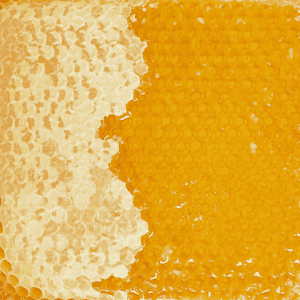Honey is mentioned over 50 times in the Bible and has been used in a variety of ways throughout history, from a sweetener for food to a symbol of God’s promises.
In this blog, we will explore the historical and cultural significance of honey in the Bible, as well as the various biblical references to honey. We will also examine the lessons we can learn from honey in the Bible, such as the importance of patience and perseverance, and the sweetness of God’s Word.
Moreover, we will compare the uses and cultural significance of honey in biblical times to those of today. The harvesting and production of honey have changed over time, as has the cultural significance of honey.
So, join me as we dive into the world of honey in the Bible and discover the lessons we can learn from this sweet substance.
What is Honey

Honey is a delicious and sweet substance produced by bees. It is made from flower nectar that the bees collect and transform into honey through a process of regurgitation and evaporation. Honey has been used for thousands of years as a natural sweetener and medicinal ingredient.
When you look at honey, you might notice that it comes in different colors and flavors, depending on the type of flowers the bees have collected nectar from. Some honey is light and mild, while others are dark and robust. But no matter the color or flavor, all honey contains natural sugars like fructose and glucose, as well as enzymes, antioxidants, and minerals.
To harvest honey, beekeepers carefully extract honeycomb frames from the beehive and scrape off the wax caps that cover the honey. Then, they spin the frames in a centrifuge to extract the honey, which is then strained to remove impurities. The result is a pure, natural, and unprocessed product that you can enjoy in a variety of ways.
Historical and Cultural Significance of Honey

Honey has been used for thousands of years, and it holds a significant place in the history and culture of many ancient civilizations, including the Bible. Honey was valued as a natural sweetener, medicine, and even a currency in some cultures.
In the Bible, honey was one of the few sweeteners available to the ancient Israelites. They would often use it as a natural source of energy and nutrition during long journeys. It was also used as a tribute or gift to kings, as it was considered a luxurious and rare commodity.
Beyond its practical uses, honey held a cultural significance as a symbol of wealth, fertility, and purity. Honey was used in religious rituals and offerings, and it was often associated with the divine. In fact, the promised land of Israel was described as a land flowing with milk and honey, a symbol of God’s abundance and blessings.
Today, honey continues to be a beloved and cherished food around the world. Its health benefits and versatility in cooking and baking make it a popular choice for those seeking natural and wholesome alternatives to refined sugars. The history and cultural significance of honey remind us of the enduring and universal appeal of this sweet and nourishing food.
Honey in the Old Testament

In the Old Testament, honey is mentioned as a symbol of God’s promises. In Exodus 3:8, God promises the Israelites that he will bring them to a land flowing with milk and honey. This promise is repeated throughout the Old Testament as a symbol of God’s faithfulness and provision.
Honey is also mentioned in Proverbs 24:13-14 as a sign of abundance and prosperity. The passage compares wisdom to honey, saying that just as honey is sweet to the taste and nourishing to the body, so too is wisdom sweet to the soul and nourishing to the spirit. The passage encourages us to seek after wisdom as we would seek after honey, recognizing its value and importance.
In 1 Samuel 14:24-27, honey plays a role in a story about King Saul’s army. Jonathan, Saul’s son, eats some honey in violation of his father’s command to fast. When Saul discovers this, he threatens to kill Jonathan, but the army steps in and defends him, recognizing the foolishness of Saul’s command. This story shows how honey can serve as a symbol of rebellion against authority, but also highlights the importance of using wisdom and discernment in following the rules and commands of those in leadership.
Overall, the Old Testament references to honey show us that it can be a symbol of God’s faithfulness, abundance, and prosperity. As we read these passages, we can reflect on the sweetness of God’s promises and the nourishment that comes from seeking wisdom and living in obedience to Him.
Honey in the New Testament

In the New Testament, honey is mentioned as a part of John the Baptist’s diet. Matthew 3:4 says, “Now John himself had a garment of camel’s hair and a leather belt around his waist, and his food was locusts and wild honey.” This verse shows that honey was considered a staple food in biblical times.
The promised land flowing with milk and honey is also mentioned in the New Testament. In Hebrews 11:9-10, it says, “By faith he made his home in the promised land like a stranger in a foreign country; he lived in tents, as did Isaac and Jacob, who were heirs with him of the same promise. For he was looking forward to the city with foundations, whose architect and builder is God.” This verse refers to the abundant blessings that God had promised His people, including the sweet taste of honey.
These references to honey in the New Testament remind us of the importance of trusting in God’s provision. Just as John the Baptist was sustained by honey in the wilderness, we too can trust that God will provide for our needs. Additionally, the promise of the land flowing with milk and honey reminds us of God’s abundant blessings and the hope we have in Him.
As we reflect on these New Testament references to honey, let us remember to trust in God’s provision and look forward to the abundant blessings He has promised us. May the sweetness of honey serve as a reminder of the sweetness of God’s love for us.
Lessons from Honey in the Bible

Honey is mentioned multiple times throughout the Bible, and it can teach us valuable lessons that still apply today.
First, honey takes patience and perseverance to obtain. In the same way, good things in life often require hard work and waiting. It’s easy to get discouraged, but if we keep working hard and trusting God, we can see the sweet rewards of our labor.
Second, honey is sweet and nourishing. Just as honey is a source of sustenance, so too is God’s Word. Reading and meditating on Scripture can be like honey for our souls, nourishing us and giving us strength to face whatever challenges come our way.
Finally, honey is a symbol of abundance and prosperity. In the Bible, it represents the good things God promises to His people. Today, we can take heart in the fact that God wants to bless us with good things. If we trust Him and seek His will, He will provide all that we need.
In summary, honey can teach us important lessons about patience, nourishment, and abundance. As we read the Bible and reflect on the sweet taste of honey, let’s remember to trust in God’s goodness and provision for our lives.
Honey in Biblical Times vs. Today

In biblical times, honey was harvested from wild bees that nested in rock crevices or in hollow trees. Beekeeping wasn’t common, so the production of honey was limited. Because of its scarcity, honey was considered a luxury and was used as a symbol of abundance and prosperity.
Today, honey is produced on a much larger scale. Beekeeping is a popular hobby and profession, and bees are kept in hives for honey production. This means that honey is widely available and affordable, and is used for a variety of purposes beyond just sweetening food.
However, the way honey is produced and consumed today is very different from biblical times. In the past, honey was often consumed raw and unprocessed, while today most honey undergoes pasteurization to increase shelf life and reduce the risk of contamination.
Despite these differences, the significance of honey in the Bible remains the same. It is still a symbol of God’s promises and the abundance of blessings that he provides. Whether you enjoy honey on your toast or use it as a natural remedy for sore throats, the sweetness of honey continues to be a reminder of God’s goodness and provision.
Honey Health Benefits

Honey not only has a significant cultural and spiritual importance but also has several health benefits. Here are some ways honey can benefit your health:
- Boosts immunity: Honey has antibacterial and antioxidant properties that can help boost your immune system. It can also help reduce inflammation in the body.
- Soothes cough and sore throat: Honey has been used for centuries to soothe cough and sore throat. It helps coat the throat and reduce irritation, making it an effective natural remedy for these symptoms.
- Aids in digestion: Honey contains enzymes that can help break down food and improve digestion. It can also help soothe digestive issues like indigestion, bloating, and constipation.
- Provides energy: Honey is a natural source of carbohydrates, providing you with a quick boost of energy. It can be especially helpful before a workout or as a natural sweetener for your morning tea or coffee.
- Promotes wound healing: The antibacterial and anti-inflammatory properties of honey can help promote wound healing. Honey has been used as a natural remedy for burns, cuts, and other skin irritations.
Incorporating honey into your daily routine can provide you with a host of health benefits. You can add honey to your tea, oatmeal, or yogurt, or use it as a natural sweetener for your smoothies and baked goods. Just be sure to choose high-quality, raw honey for maximum health benefits.
Uses for Honey

Honey has been used for thousands of years as a natural sweetener and a source of energy. Here are some simple and practical ways you can use honey in your daily life:
- Sweetener: Replace refined sugar with honey in your tea, coffee, or baking. Honey is a natural sweetener that doesn’t cause a rapid spike in blood sugar levels, making it a healthier option.
- Cough remedy: Mix honey with warm water or tea to soothe a sore throat and calm coughing. The natural antibacterial properties of honey can also help fight off infections.
- Skin moisturizer: Mix honey with a carrier oil like olive or coconut oil and apply it to your skin. Honey is a natural humectant, which means it can help keep your skin hydrated and moisturized.
- Wound healing: Apply honey directly to minor cuts, scrapes, or burns to help speed up the healing process. Honey has natural antibacterial and anti-inflammatory properties that can reduce the risk of infection and inflammation.
- Hair conditioner: Mix honey with warm water and apply it to your hair for a natural deep conditioning treatment. Honey can help nourish and moisturize your hair, leaving it soft and shiny.
In conclusion, honey is not only a delicious and healthy sweetener, but it also has numerous benefits for our health and beauty. Try incorporating honey into your daily routine in these simple ways and experience the natural goodness it has to offer.
Honey in the Bible Conclusion
Honey in the Bible holds a significant place in both history and culture. It has been mentioned numerous times in the Old and New Testaments, often representing God’s promises and abundance. Honey serves as a symbol of spiritual nourishment and patience, reminding us to seek the sweetness of God’s Word.
Although the production and use of honey have changed over time, its significance remains just as powerful. We can learn valuable lessons from honey in the Bible, such as the importance of taking the time to harvest the fruits of our labor and the value of perseverance.
As you continue your spiritual journey, let the symbolism of honey in the Bible remind you of the sweetness and richness of God’s promises. Take the time to savor the Word of God, and allow it to nourish your soul. May the lessons of honey in the Bible guide you toward a deeper understanding of God’s love and blessings in your life?

